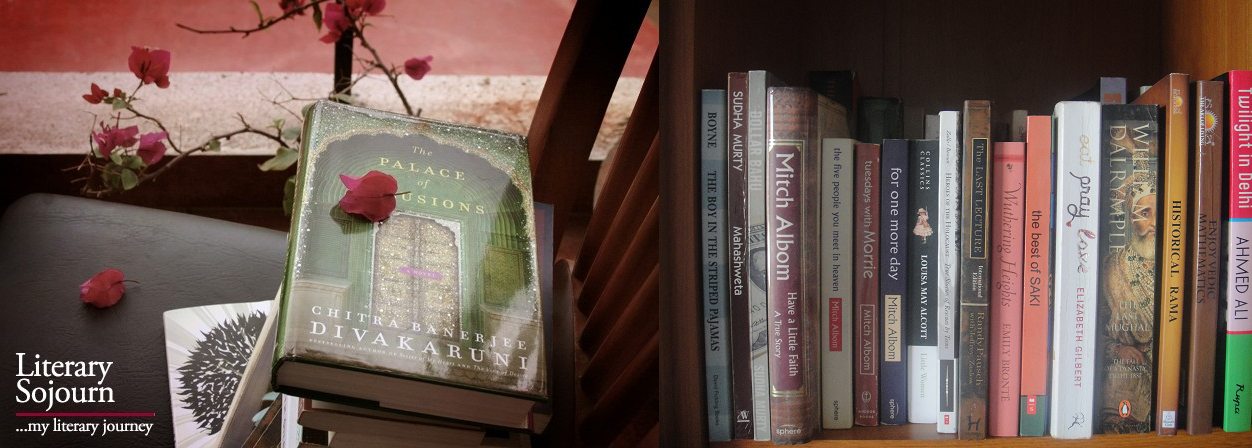
Title : Jaya - An Illustrated Retelling of the Mahabharata
Author : Devdutt Pattanaik
Publisher : Penguin India
ISBN : 978-0-143-10425-4
A friend of mine gave 'Jaya' to me to read and going by the first instinct, I read the back cover of the book and what I read greatly intrigued me, fascinated me, captivated me and enthralled me, despite the fact that I have heard the story many times atleast in bits and pieces from different sources, watched almost every episode of the BR Chopra's serial by the same name on television, read it as a part of our school curriculum in one of the middle classes and later read some other interpretations of the story - as told by Chitra Banerjee Divakaruni in 'Palace of Illusions' and the brilliant parallelism to the current scenario that Gurcharan Das drew in his 'Difficulty of Being Good'.
Without much ado, I think I should just copy the gist of this great epic as is shown on the back cover:
The Mahabharata is an ancient Hindu epic where:
A son renounces sex so that his old father can remarry
A daughter is a prize in an archery contest
A teacher demands half a kingdom as his tuition fee
A student is turned away because of his caste
A mother asks her sons to share a wife
A father curses his son-in-law to be old and impotent
A husband lets another man make his wife pregnant
A wife blindfolds herself to share her husband's blindness
A forest is destroyed for a new city
A family is divided over inheritance
A king gambles away his kingdom
A queen is forced to serve as a maid
A man is stripped of his manhood for a year
A woman is publicly disrobed
A war is fought where all rules are broken
A shift in sexuality secures victory
The vanquished go to paradise
The victors lose their children
The earth is bathed in blood
God is cursed
Until wisdom prevails
I do not feel the need to give even a small glimpse of the story here. The one of its kind epic, unmatched, unparalleled, abundant with all possible forms of emotions and feelings, very rightly lives up to the fame of 'what is here can be elsewhere, what isn't here cannot be anywhere else'. Such is the vastness of this epic. It has been a great research topic for many religious gurus, research community, warriors, businesspeople, sociologists and even after thousands of years since its inception, there is a lot that we all can learn from it. One of the significant parts of the epic, the discourse between Nara and Narayana - Arjun and God at the beginning of the battle - the Bhagvad Gita (presented as 'Song of the God' here), teaches the doctrine of life, the ultimate knowledge of being in the transient world.
Devdutt's book covers a wide range of plots and subplots in a very detailed manner while at the same time keeping it brief so that the main story line is not forgotten in the details of the subplots. Some of these short stories are very self contained and can be a good source of stories to read to children. Since Mahabharata has been written, translated and interpreted by many and in many different languages, there are many variations in the main story as well as the tertiary streams of stories that join the main saga. At the end of each chapter, the author has summarized some of these variations, cultural influences on the narrative and elaborated upon some specific portions even further.
Jaya is an extremely well written story presented systematically in 18 sections and 108 chapters maintaining just the right balance between detail and brevity. The readers will find many of their doubts getting answered as they go along, even the reason why this book is titled 'Jaya' and which victory is actually the one that is being referred to here. Weaving the tales from classical Sanskrit and regional and folk variations make it an enriching and enlightening reading experience. How can I forget mentioning the line illustrations by the author himself beautifully capturing the essence of the chapters - they work as the icing on the cake.
Some of the excerpts from the book which I really want to share here:
- Vyasa classified the hymns and created four collections - Rig, Yadur, Sama and Atharva. On completing this monumental task, Vyasa has this inexplicable urge to write a story, one that would convey the most abstract of Vedic truths to the simplest men in the farthest corners of the world in the most concrete of forms. The gods liked the idea and sent the elephant-headed Ganesha to serve as his scribe.
Ganesha said, "You must narrate without a pause." This would ensure that what Vyasa dictated was not adulterated by human prejudice.
"I will", said Vyasa, 'provided you write nothing unless it makes sense to you. This ensured that all that was written appealed to the divine.
- The war between Kauravas and Pandavas was about Dharma and not for justice. And dharma is not about justice, it is about empathy and wisdom. Dharma is not about defeating others, it is about conquering ourselves. Everybody wins in dharma. When the war at Kurukhsetra concluded even the Kauravas went to paradise.
- Neither the Pandavas nor the Kauravas learnt the lessons of - futility of rage and the value of forgiveness - something that ultimately cost the Kuru clan dearly.
- Story of Ram, Ramayana speaks of a model king and his model reign. The Mahabharata by contrast, is more about imperfect kings and their imperfect reigns. In the Ramayana, Vishnu upholds rules as Ram while in the Mahabharata, Vishnu changes rules as Krishna. In the Ramayana, God is king while in the Mahabharata, God is kingmaker.
- Krishna offers Arjuna two things : what he is and what he has. Arjun chooses what Krishna is. Duryodhana is happy with what Krishna has. This divide between him and his, me and mine, what one is and what one has, is the difference between seeking the soul and being satisfied with matter.








.png)








